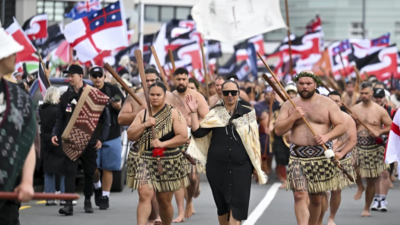
In a present of unity, tens of hundreds of protesters marched to New Zealand’s Parliament on Tuesday, demanding the preservation of Māori treaty rights. The demonstration, one of many largest in New Zealand’s current historical past, highlights rising tensions over ACT occasion chief David Seymour’s proposed invoice to alter the nation’s founding treaty between the British Crown and Māori chiefs.
What’s the
The Treaty of Waitangi, thought of New Zealand’s founding doc, exists in two variations—English and Māori—that differ on essential factors, notably across the Māori chiefs’ autonomy and land rights. It was signed on February 6, 1840, by representatives of the British Crown and chiefs. Over the centuries, breaches by the Crown led to the lack of Māori lands and suppression of their language.
For the reason that Seventies, Māori activism and authorized motion have reshaped how New Zealand handles the treaty. Billions have been paid in settlements, the Māori language has revived, and treaty ideas now information the nation’s legal guidelines.
A weeklong protest
The protests, following the Māori custom of ‘hīkoi‘, began every week in the past and travelled throughout the nation earlier than reaching Wellington. Crowds marched by means of the streets of the capital, waving flags, singing Māori songs, and holding placards that voiced opposition to the invoice. Police estimated over 40,000 folks crammed Parliament’s grounds and the encircling streets, forcing street closures.
“We’re strolling for the guarantees made to our ancestors,” stated one protester.
The invoice, launched by David Seymour, chief of a small libertarian occasion, goals to set clear definitions for the treaty’s ideas. The invoice has sparked political uproar, with critics claiming it may undo many years of progress in respecting the 1840 Treaty of Waitangi between Māori chiefs and the British Crown.
Seymour’s invoice
Minister for Regulation of New Zealand, David Seymour’s invoice goals to redefine the treaty’s ideas and apply them universally, arguing that the present system unfairly benefits Māori. “Piecemeal building of the treaty’s that means has left a vacuum and has given Māori particular therapy,” stated Seymour.
Critics, together with former prime ministers, authorized consultants, and Māori leaders, warn that the invoice compromises the structure and weakens treaty-guaranteed rights.
Prime Minister Christopher Luxon stated the proposal won’t grow to be a legislation.



